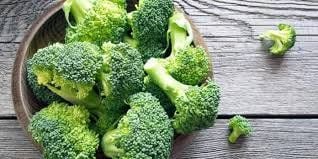This is an automatically translated article.
Cauliflower is a food that provides antioxidants, phytonutrients, fiber and other important nutrients. While the benefits and side effects of cauliflower vary from person to person, for most people, eating this cruciferous vegetable is a positive step toward good health.1. The effect of cauliflower
1.1. Helps develop digestive system
Cauliflower is high in fiber and water. Both are important for preventing constipation, maintaining a healthy digestive tract, and reducing the risk of colon cancer.
Studies have shown that fiber can also help regulate the immune system and inflammation. It may reduce the risk of inflammation-related diseases such as cardiovascular disease, diabetes, cancer, and obesity.
Eating fiber helps prevent diseases such as:
Coronary heart disease Stroke prevention Prevention of high blood pressure Diabetes Overweight and obesity Some gastrointestinal diseases Higher fiber intake seems to help lower blood pressure blood pressure and cholesterol levels, improve insulin sensitivity and promote weight loss for people with obesity.
1.2. Reduce the risk of cancer
In cauliflower contains antioxidants that help prevent cell mutations. One of these antioxidants is indole-3-carbinol or I3C, which is commonly found in cruciferous vegetables, such as cabbage, broccoli, and cauliflower. It has been shown to reduce the risk of breast cancer and reproductive cancer in men and women.
Cauliflower also prevents diseases such as colon cancer, liver cancer, lung cancer, and stomach cancer. Effective in inhibiting the growth of cancerous cells, stopping the cells. In the body, there are glucosinolates, which work to regenerate DNA and help prevent cancer by slowing the growth of cancer-causing cells in the body.
1.3. Help strengthen bones
Low intake of vitamin K is associated with a higher risk of fractures and osteoporosis.
Consuming vitamin K can improve bone health by acting as a regulator of bone matrix proteins, improving calcium absorption and blocking urinary calcium excretion.

Ăn súp lơ mang lại rất nhiều lợi ích sức khỏe
1.4. Improve circulatory function
Eating more fiber has been shown to reduce the risk of cardiovascular problems.
People who take calcium supplements may have an increased risk of calcium buildup in the blood vessels, but taking vitamin K along with calcium may reduce the risk of this happening.
1.5. Reduce the risk of heart disease
Currently increasing cardiovascular diseases, diabetes, neurological disorders such as Parkinson's disease and Alzheimer's disease. Cauliflower is rich in nutrients such as vitamin K, vitamin C and antioxidants and omega-3s that help keep arteries and blood vessels free from atherosclerosis and plaque buildup. Therefore, it helps to prevent and reduce the risk of high blood pressure and control cholesterol levels in the blood.
1.6. Good source of antioxidants
Cauliflower is an excellent source of antioxidants, which help protect your cells from harmful free radicals and inflammation.
Like other cruciferous vegetables, cauliflower is particularly high in glucosinolates and isothiocyanates, two groups of antioxidants that have been shown to slow the growth of cancer cells.
In test-tube studies, glucosinolates and isothiocyanates have been shown to be particularly protective against colon, lung, breast, and prostate cancers.
Cauliflower contains the antioxidants carotenoids and flavonoids, which have anti-cancer effects and may reduce the risk of several other diseases, including heart disease.
1.7. May aid in weight loss
Firstly, it is low in calories with only 25 calories so you can eat a lot without gaining weight.
It can also be used as a low-calorie substitute for high-calorie foods, such as rice and flour.
Being a good source of fiber, cauliflower slows down digestion and promotes satiety. This can automatically reduce the number of calories you eat during the day, an important factor in weight control.
The high water content is another weight loss friendly aspect of cauliflower. In fact, 92% of its weight is made up of water.
2. Is cauliflower good for pregnant women?

Súp lơ có rất nhiều lợi ích cho sức khỏe cho phụ nữ mang thai
Cauliflower has many health benefits. It contains vitamins B1, B3, B6, vitamin C, folic acid, calcium, magnesium, phosphorus and omega-3 acids. It is also a source of human body growth and a good source of protein and unsaturated fats. It is rich in fiber and antioxidants that help protect cells from mutations caused by unstable molecules. Cauliflower is eaten raw or cooked, preferably steamed with a small amount of water so as not to lose vitamin C.
The most important benefits of cauliflower for pregnant women:
Firstly, soup It is an anti-inflammatory drug that pregnant women can have, limiting the incidence of diabetes because it contains vitamin C and potassium.
Second, eating cauliflower helps to get rid of obesity, it stimulates and generates heat in the body that has the effect of burning fat. And thus help pregnant women not gain much weight during pregnancy.
Third, cauliflower helps strengthen the immune system, prevents infections and helps maintain electrical balance in the body, lowers blood pressure and cholesterol, reduces heart disease, helps with detoxification, purification and liver purification. All of these benefit pregnant women to protect them from many diseases and health problems that can be acquired during pregnancy.
Fourth, should eat cauliflower, also known as cauliflower because it contains a large percentage of folic acid, which helps support in the fetal development stages and provides a full range of necessary vitamins and minerals.
Fifth, cauliflower is considered one of the vegetables rich in phosphorus, which has the effect of reducing indigestion, a problem that any pregnant woman has.
Please dial HOTLINE for more information or register for an appointment HERE. Download MyVinmec app to make appointments faster and to manage your bookings easily.













